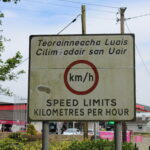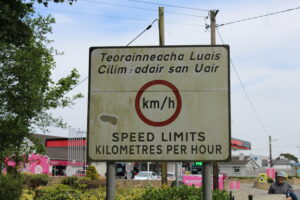In January 2021 the UK effectively left the EU and a number of changes began taking effect. Protests against the new arrangements have occurred in places like Belfast and dissatisfaction is apparent, but some are optimistic about the opportunities of the situation.
8/6-2021 by Simone Dreessen and Sandra Kaarsgaard
The question of Northern Ireland (NI) has been a focal point of the Brexit negotiations. When Boris Johnson struck a deal with the EU on December 24th 2020, the UK only had a week to brace for what was coming:

“People were just not prepared. Businesses who normally trade with Northern Ireland were simply unaware of the changed situation, which has caused difficulties with coming to terms with the UK government’s obligations and the organization of formalities and checks,” says David Phinnemore, professor of anthropology, history and politics at Queens University of Belfast.
Sea border over land border
In order to avoid a hard border on the island of Ireland, a sea border between NI and the rest of the UK has been put in place. However, the risk of hardening the Irish border causes major concern.
Cara Hunter, member of NI’s Legislative Assembly (MLA) for the Social Democratic Labor Party (SDLP) says:
“The hardening of the border would mean reopening psychological wounds from The Troubles. I fear for young people due to unemployment and to a number of economic issues in the country and I fear a hard border would lead to violence.”

Sandra Moffett, doctor and Senior Lecturer at the Department of Hospitality and Tourism Management at Ulster University Business School, prefers the sea border over the land border, despite having seen disruptions in supply chains and difficulties for businesses:
“Without a hard land border, we’re able to move freely in the border region. If there’s a hard land border, it will really impact the freedom of work, travel and studying etc. The sea border doesn’t affect peoples’ daily lives in the same way.”
The protocol
As part of the withdrawal agreement, the protocol on Ireland/NI including the Irish Sea Border was put in place, setting the framework for border checks and formalities on the movement of goods in and out of NI.
The implementation of the protocol has sparked mixed reactions, as can be seen in a recent survey called “What do voters in Northern Ireland think about the Protocol on Ireland/Northern Ireland?” from Queen’s University of Belfast:
Unionists in NI are dissatisfied with the sea border and the protocol, says David Phinnemore:
“Those who identify as British see this as compromising Northern Ireland’s position in the UK. It’s disrupting the movement of goods within the UK, which they don’t think should be happening, and longer term they think it’s undermining Northern Ireland’s position constitutionally.”
Politicians’ views on the protocol
“Those who identify as British see this as compromising Northern Ireland’s position in the UK. It’s disrupting the movement of goods within the UK, which they don’t think should be happening, and longer term they think it’s undermining Northern Ireland’s position constitutionally.”
The newly elected leader of the Democratic Unionist Party (DUP) in NI, Edwin Poots, said in an interview with Sky News on May 19th, that with maintaining a border in the Irish Sea, the British government is “playing fast and loose with the Good Friday Agreement.”

Other political parties in NI see it differently.
“There is a lot of resentment amongst some people in Northern Ireland because the majority here didn’t vote for Brexit, but I think, with regards to the protocol, that it places Northern Ireland with some economic opportunities,” says Cara Hunter of the SDLP.
Stewart Dickson, MLA for the Alliance Party, also expresses optimism in relation to the protocol:
“We genuinely believe the protocol provides great opportunities for us: it allows us to trade inside the UK while allowing us to trade from the UK without a border into the rest of the EU.”
He acknowledges the unionists’ argument, but disagrees:
“There are political parties here, mainly the DUP, who see that as an infringement of the UK sovereign rights. It’s simply not an issue I subscribe to at all. I do understand where they’re coming from, but I think they’re on the wrong side of history in this regard.”
Colm Gildernew, MLA for Sinn Féin, points to a number of problems with the sea border, such as inconvenience in ordinary commerce and business and the flow of goods, but says that:
“The flow of goods is rapidly reorienting to take the new realities into account, and I would encourage everyone to work together to ensure that the worst impacts of Brexit are mitigated.”




